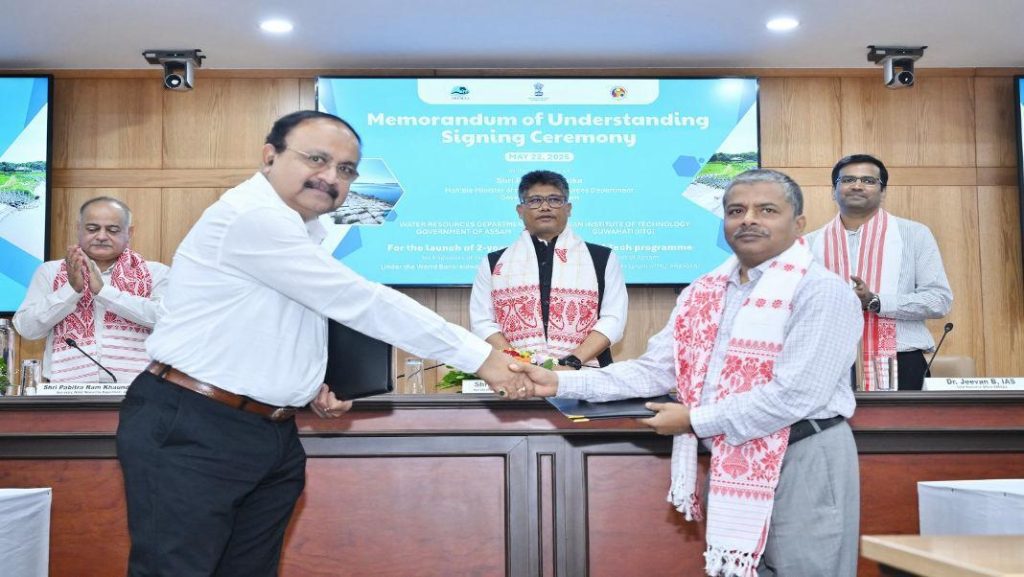
Assam Preps Engineers to Battle Floods
Assam, a state in India’s northeastern region, has been grappling with recurring floods for years. The state’s geography, with its vast riverine plains and mountainous terrain, makes it prone to severe rainfall and flash floods. To tackle this issue, the Assam government has partnered with IIT Guwahati to train engineers in advanced flood control technology through an online M Tech program. This initiative, backed by the Flood and River Erosion Management Agency of Assam (FREMAA) and the World Bank, aims to modernize the state’s infrastructure and equip engineers with the skills to design and implement smarter, tech-driven flood management systems.
Over the next 10 years, the program will train 200 engineers annually, with 20 engineers being enrolled in the program each year. This significant investment in human capacity building is a vital step towards mitigating the devastating impact of floods on Assam’s population and economy.
Floods in Assam are a recurring phenomenon, with the state experiencing some of the worst floods in recent years. In 2012, the Brahmaputra River burst its banks, inundating over 1.5 million people in 26 districts. Similarly, in 2019, the state witnessed one of its worst floods in decades, with over 1.2 million people affected. The economic losses from these floods have been staggering, with the state government estimating losses of over INR 2,000 crores (approximately USD 270 million) in 2019 alone.
The Assam government’s partnership with IIT Guwahati is a significant step towards addressing the state’s flood management challenges. The online M Tech program, which is designed to be completed in two years, will provide engineers with advanced knowledge and skills in flood control, water resources management, and disaster risk reduction. The program will focus on developing innovative solutions that incorporate cutting-edge technologies, such as Geographic Information Systems (GIS), Remote Sensing (RS), and Artificial Intelligence (AI), to analyze and predict flood patterns.
The program’s curriculum will be designed to cater to the specific needs of Assam’s flood management challenges. It will cover topics such as flood hydrology, water quality management, and structural and non-structural flood control measures. The program will also include hands-on training sessions, where students will work on real-world projects to design and implement flood management systems.
One of the key benefits of the program is its ability to equip engineers with the skills to design and implement flood management systems that are tailored to Assam’s unique geography and climate. The state’s floods are often caused by a combination of factors, including heavy rainfall, siltation, and poor drainage infrastructure. By equipping engineers with the skills to analyze and mitigate these factors, the program aims to reduce the impact of floods on Assam’s population and economy.
The program’s impact will not be limited to Assam alone. The skills and knowledge gained by the engineers will be transferable to other states and regions in India that are prone to floods. This will enable India to develop a pool of flood management experts who can design and implement effective flood management systems across the country.
The World Bank’s support for the initiative is a testament to the global recognition of Assam’s flood management challenges. The World Bank has been a long-standing partner of Assam, providing financial and technical assistance to the state to improve its infrastructure and services. The bank’s support for the program will help to ensure that the state’s flood management systems are designed and implemented with global best practices in mind.
In conclusion, Assam’s partnership with IIT Guwahati to train engineers in advanced flood control technology is a significant step towards mitigating the impact of floods on the state’s population and economy. The program’s focus on developing innovative solutions that incorporate cutting-edge technologies will enable engineers to design and implement smarter, tech-driven flood management systems. Over the next 10 years, the program will train 200 engineers annually, equipping them with the skills to tackle Assam’s recurring floods and reducing the economic losses from these disasters.






